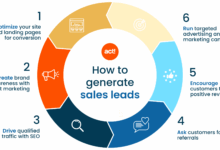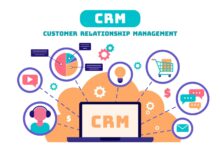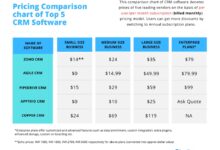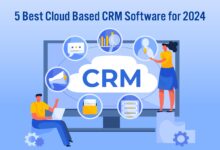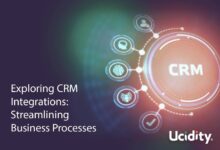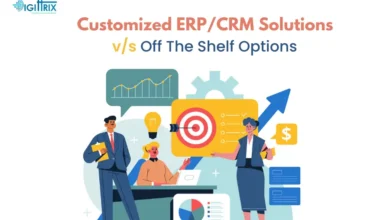CRM Software For Sales Automation: Streamlining Sales Processes With Efficiency
CRM Software for Sales Automation sets the stage for this enthralling narrative, offering readers a glimpse into a story that is rich in detail, brimming with originality from the outset. This software plays a vital role in enhancing sales automation processes, boosting productivity, and improving customer relationships.
As we delve deeper into the world of CRM software, we uncover its key features, benefits, and implementation strategies that empower sales teams to thrive in a competitive landscape.
Introduction to CRM Software for Sales Automation
CRM (Customer Relationship Management) software plays a crucial role in automating sales processes and enhancing customer interactions. By centralizing customer data and streamlining communication, CRM software enables sales teams to work more efficiently and effectively. Popular CRM software used for sales automation include Salesforce, HubSpot, and Zoho CRM.
Benefits of Using CRM Software in Sales Processes
- Improved lead management and tracking
- Enhanced communication and collaboration within sales teams
- Increased sales productivity and efficiency
- Personalized customer interactions and targeted marketing efforts
Key Features in CRM Software for Sales Teams
- Lead management tools
- Sales pipeline management
- Contact management and segmentation
- Automated task and workflow management
Integration with Other Tools
CRM software seamlessly integrates with email marketing platforms like Mailchimp and marketing automation tools like Marketo. This integration allows for a more cohesive approach to customer engagement and marketing campaigns.
Implementing CRM Software Effectively
- Provide adequate training to sales teams on how to use the software
- Customize the CRM to align with your sales processes and goals
- Regularly update and clean the database to ensure data accuracy
Data Security and Compliance
Ensuring data security and compliance with regulations like GDPR is essential when using CRM software. Implementing access controls and encryption measures can help safeguard sensitive customer information.
Successful Sales Automation Strategies
Case studies have shown that companies utilizing CRM software for sales automation have experienced significant improvements in lead conversion rates, customer retention, and overall sales performance.
Key Features of CRM Software for Sales Automation
CRM software plays a vital role in automating sales processes and enhancing customer relationship management. Below are some key features that a CRM software should have for effective sales automation:
Data Management and Organization
- Centralized database for storing customer information
- Ability to track customer interactions and history
- Segmentation and categorization of leads for targeted marketing
Lead Management
- Lead scoring and prioritization based on engagement levels
- Automated lead assignment to sales representatives
- Lead nurturing workflows for converting leads into customers
Sales Pipeline Management
- Visual representation of the sales pipeline stages
- Monitoring of deals and opportunities in real-time
- Automated reminders and notifications for follow-ups
Workflow Automation
- Automated task assignments and scheduling
- Integration with email marketing platforms for personalized communication
- Automated data entry and updates to reduce manual work
Reporting and Analytics
- Customizable sales reports and dashboards for performance tracking
- Insights into sales trends, conversions, and team productivity
- Forecasting tools for predicting future sales revenue
Implementation of CRM Software for Sales Automation
Implementing CRM software effectively in sales automation is crucial for streamlining processes and maximizing efficiency. Here are some best practices and guidelines to consider:
Integrating CRM Software with Existing Sales Systems
- Assess current sales processes and identify areas where CRM software can enhance efficiency.
- Select a CRM software that aligns with the needs and goals of your sales team.
- Create a detailed integration plan outlining the steps, timeline, and responsibilities.
- Train sales team members on how to use the CRM software effectively.
Common Challenges During CRM Software Implementation
- Lack of user adoption: Ensure proper training and support to encourage employees to embrace the new system.
- Data quality issues: Conduct regular data audits and provide guidelines for data entry to maintain accuracy.
- Resistance to change: Communicate the benefits of CRM software and involve sales teams in the decision-making process.
Importance of Data Migration
When integrating CRM software with existing sales systems, data migration is crucial for transferring customer information seamlessly. Ensure data integrity and consistency throughout the migration process to avoid errors and discrepancies.
Key Performance Indicators (KPIs)
- Sales conversion rate
- Customer retention rate
- Lead response time
- Customer satisfaction score
Customization Options in CRM Software
CRM software offers a range of customization options to tailor the platform to specific sales processes. This includes custom fields, workflows, and reporting features that can be configured to meet the unique needs of your sales team.
Training and Onboarding Process
- Provide comprehensive training sessions for sales teams to ensure they are proficient in using the CRM software.
- Offer ongoing support and resources to address any questions or concerns that may arise during the onboarding process.
Data Security and Privacy
Implement robust security measures to safeguard sensitive customer data stored in the CRM software. This includes encryption, access controls, and regular security audits to prevent unauthorized access and data breaches.
Customization and Personalization in CRM Software
Customization and personalization play a crucial role in enhancing the effectiveness of CRM software for sales automation. Tailoring CRM solutions to meet specific sales needs can greatly improve sales performance and streamline processes. Let’s delve deeper into the importance and impact of customization in CRM software.
Importance of Customizing CRM Software
- Customizing CRM software allows businesses to align the system with their unique sales processes and requirements.
- By tailoring CRM software, sales teams can work more efficiently and effectively, leading to increased productivity and better customer relationships.
- Personalizing CRM solutions can help in capturing relevant data, generating insightful reports, and making informed decisions.
Examples of Personalization for Different Sales Teams
- For an outbound sales team, customizing CRM software to prioritize lead follow-ups and automate outreach campaigns can boost conversion rates.
- Inside sales teams can benefit from personalized dashboards that display key performance metrics and allow for quick access to customer information.
- Field sales teams may require mobile-friendly CRM interfaces that enable real-time updates and access to customer data on-the-go.
Impact of Personalized CRM Solutions on Sales Performance
- Personalized CRM solutions can lead to improved sales forecasting accuracy, better lead management, and enhanced customer engagement.
- By customizing CRM software, sales teams can deliver more targeted marketing campaigns, resulting in higher conversion rates and increased revenue.
- Enhanced user adoption and satisfaction can be achieved through personalized CRM solutions, leading to a more motivated and productive sales team.
Key Features to Customize in CRM Software for Effective Sales Management
- Customizable dashboards and reports to track performance metrics and sales KPIs.
- Workflow automation and lead scoring systems tailored to the sales process of the organization.
- Integration with other tools and applications used by the sales team for seamless data flow.
Off-the-Shelf CRM Software vs. Customized CRM Solutions
- Off-the-shelf CRM software offers standard features and may not fully meet the unique requirements of a sales team.
- Customized CRM solutions provide flexibility and scalability to adapt to changing business needs and sales strategies.
- While off-the-shelf CRM software is cost-effective and easy to implement, customized CRM solutions offer a higher ROI and increased competitive advantage.
Tailoring CRM Software for Specific Sales Departments
- Identify the unique needs and goals of the sales department that require customization in the CRM software.
- Collaborate with sales team members to gather feedback and insights on the current CRM system and areas for improvement.
- Work with CRM software providers or internal IT teams to customize features, workflows, and integrations based on the identified requirements.
Data Management and Analysis in CRM Software
Data management is a crucial aspect of CRM software for sales automation, as it involves organizing and storing customer information effectively. By utilizing CRM software, businesses can streamline data management processes and ensure all relevant data is easily accessible.
Role of Data Management in CRM Software
- Centralized Data Storage: CRM software allows businesses to store customer data in one centralized location, making it easy to access and update information as needed.
- Data Segmentation: By categorizing data based on various criteria, businesses can target specific customer segments with personalized marketing campaigns.
- Data Security: CRM software ensures that customer data is secure and protected from unauthorized access, helping businesses comply with data protection regulations.
Analyzing Sales Data for Decision-Making
- Identifying Trends: CRM software helps in analyzing sales data to identify trends and patterns, enabling businesses to make informed decisions about their sales strategies.
- Performance Evaluation: By tracking key performance indicators (KPIs) through CRM software, businesses can evaluate the effectiveness of their sales efforts and make necessary adjustments.
- Customer Insights: CRM software provides valuable insights into customer behavior and preferences, helping businesses tailor their sales approach to meet customer needs effectively.
Utilizing CRM Data for Sales Forecasting and Strategy Development
- Forecasting Accuracy: By leveraging historical sales data stored in CRM software, businesses can predict future sales trends more accurately and plan their sales strategies accordingly.
- Strategy Optimization: CRM data can be used to optimize sales strategies by identifying areas for improvement, targeting high-potential leads, and enhancing customer engagement.
- Personalized Marketing: With CRM data, businesses can create personalized marketing campaigns based on customer preferences and behaviors, increasing the likelihood of sales success.
Integration with Marketing Automation Tools
Integrating CRM software with marketing automation tools offers numerous benefits for businesses looking to streamline their sales and marketing processes.
Enhanced Lead Generation and Customer Engagement
By integrating CRM with marketing automation tools, businesses can track customer interactions more effectively, segment leads based on behavior, and personalize marketing campaigns to target specific customer segments.
This integration can lead to higher conversion rates and improved customer satisfaction.
Challenges and Solutions for Integration
One common challenge in integrating CRM and marketing automation is syncing data accurately between the two systems. Solutions include using middleware platforms to facilitate data transfer and ensuring proper mapping of fields.
Regular audits and monitoring can help identify and address any integration issues promptly.
Comparison Table of CRM Software and Marketing Automation Tools
| CRM Software | Marketing Automation Tools | Key Features |
|---|---|---|
| HubSpot CRM | HubSpot Marketing Hub | Lead scoring, email marketing, automation workflows |
| Salesforce CRM | Pardot | Lead nurturing, campaign tracking, ROI reporting |
Setting Up Integration Between CRM and Marketing Automation
To set up integration between CRM software and marketing automation tools, businesses should first identify the data points to be synchronized, configure integration settings in both systems, test the connection, and establish workflows for automated actions based on triggers.
Regularly reviewing and optimizing the integration ensures seamless data flow and process automation.
Successful Case Studies
Company A successfully integrated their CRM with marketing automation tools, resulting in a 20% increase in lead conversion rates and a 15% improvement in customer retention. Company B saw a 25% reduction in manual tasks and a 30% increase in marketing ROI after implementing the integration.
Mobile Accessibility and CRM Software
Mobile accessibility is crucial in CRM software for remote sales teams, allowing them to access important data and tools on-the-go. It enables sales representatives to stay connected with their leads and customers, even when they are not in the office. Here are some key points to consider regarding mobile accessibility in CRM software:
Importance of Mobile Accessibility in CRM Software
- Access to real-time data: Sales teams can access customer information, sales pipelines, and communication history anytime, anywhere.
- Improved productivity: Mobile accessibility enables sales reps to respond to leads quickly, update records on-the-go, and stay organized.
- Enhanced customer experience: With mobile CRM, sales reps can provide personalized and timely responses to customer inquiries, leading to better customer satisfaction.
Features for User-Friendly CRM Software on Mobile Devices
- Responsive design: CRM software should be optimized for various mobile devices, ensuring a seamless user experience across different screen sizes.
- Mobile app availability: Providing a dedicated mobile app for CRM allows sales reps to access key features easily and efficiently.
- Offline access: Sales teams should be able to work on CRM tasks even without an internet connection, with changes syncing once connectivity is restored.
Tips for Optimizing CRM Usage on Mobile Platforms for Sales Automation
- Regularly sync data: Ensure that all updates made on mobile devices are synced with the CRM system to maintain data accuracy.
- Utilize push notifications: Enable push notifications to stay updated on important tasks, meetings, and follow-ups without missing any critical information.
- Train your team: Provide training on using CRM software on mobile devices effectively to maximize productivity and efficiency.
Customer Relationship Management Strategies
Customer Relationship Management (CRM) strategies are essential for businesses to effectively manage relationships with their customers. By implementing the right CRM strategies, companies can build long-term relationships, enhance customer satisfaction, and drive sales growth. CRM software plays a crucial role in automating and streamlining these strategies to ensure a personalized and efficient customer experience.
Utilizing Customer Data for Personalization
One key CRM strategy is utilizing customer data for personalization. By collecting and analyzing customer information, businesses can tailor their products, services, and marketing efforts to meet the specific needs and preferences of individual customers. This personalized approach not only enhances customer satisfaction but also fosters loyalty and long-term relationships.
- Segmenting Customer Data: Divide customers into different segments based on demographics, behavior, or buying patterns to create targeted marketing campaigns.
- Implementing Personalized Communication: Use customer data to send personalized emails, messages, or offers that resonate with each customer individually.
- Creating Customized Products/Services: Develop customized products or services based on customer feedback and preferences to meet their unique requirements.
Building Customer Loyalty through Engagement
Another important CRM strategy is building customer loyalty through engagement. By engaging with customers regularly and providing exceptional service, businesses can strengthen relationships and encourage repeat purchases.
“Engaged customers are more likely to become loyal customers, leading to increased retention rates and higher lifetime value.”
- Offering Personalized Support: Provide personalized support and assistance to customers through various channels such as live chat, phone, or email.
- Creating Loyalty Programs: Implement loyalty programs to reward customers for their repeat business and encourage them to stay loyal to the brand.
- Soliciting Customer Feedback: Regularly seek feedback from customers to understand their needs, preferences, and areas for improvement to enhance the overall customer experience.
Training and Support for CRM Software
Training and support are crucial aspects of implementing CRM software effectively. User training ensures that the team can maximize the benefits of the software, while ongoing support helps address any issues that may arise.
Setting Up User Accounts and Permissions
- Start by creating user accounts for each team member, assigning unique usernames and passwords.
- Establish different permission levels based on roles within the sales team, such as admin, manager, and sales representative.
- Define access levels for each user, specifying which modules or data they can view, edit, or delete.
- Regularly review and update user permissions to ensure data security and compliance.
Importing and Exporting Data
- Before importing data, ensure that it is clean, consistent, and formatted correctly to prevent errors.
- Use CRM tools to map data fields during the import process, matching fields from the source to the CRM system.
- Regularly export data for backups and analysis, following best practices for data retention and storage.
- Implement data deduplication processes to maintain data integrity and avoid duplicates.
Customizing CRM Software for Sales Workflows
- Identify specific needs and workflows of the sales team before customizing the CRM software.
- Create custom fields, modules, or dashboards to align the software with the unique requirements of the team.
- Integrate third-party apps or plugins to enhance the functionality of the CRM software for sales automation.
- Regularly review and optimize customizations based on feedback and evolving business needs.
Utilizing Data Analytics and Reporting Features
- Generate custom reports to track sales performance, pipeline status, and key metrics using CRM analytics tools.
- Use data visualization tools to present insights and trends for better decision-making within the sales team.
- Leverage predictive analytics to forecast sales trends and identify potential opportunities for growth.
- Create automated reports and alerts to keep the team informed and proactive in their sales efforts.
Addressing Common Challenges in CRM Software Usage
- Train team members regularly on new features and updates to overcome resistance to change.
- Provide dedicated support channels and resources for troubleshooting technical issues promptly.
- Encourage feedback from users to identify pain points and areas for improvement in CRM software usage.
- Offer incentives or rewards for consistent and effective use of CRM software to drive adoption and engagement.
Resources for Ongoing Training and Professional Development
- Enroll team members in online courses or certification programs specific to CRM software to enhance their skills and knowledge.
- Provide access to user manuals, video tutorials, and knowledge base articles for self-paced learning and troubleshooting.
- Organize regular training sessions, workshops, or webinars to address advanced topics and best practices in CRM software usage.
- Encourage peer-to-peer learning and knowledge sharing within the sales team to foster a culture of continuous improvement.
Benefits of Integrating CRM Software with Other Tools
- Streamline workflows and data sharing by integrating CRM software with email marketing platforms for targeted campaigns.
- Improve collaboration and communication by connecting CRM software with project management tools for seamless task management.
- Enhance customer engagement and retention by integrating CRM software with social media platforms for personalized interactions.
- Automate data sync between CRM software and other tools to reduce manual effort and errors in data entry.
Security and Compliance in CRM Software
Data security and compliance are crucial aspects of CRM software for sales automation, as they ensure the protection of sensitive customer information and help businesses adhere to regulatory requirements.
Importance of Data Security and Compliance
- Implementing robust data security measures in CRM software is essential to prevent unauthorized access and data breaches.
- Compliance with regulations such as GDPR, HIPAA, and CCPA is necessary to avoid legal consequences and maintain customer trust.
- Failure to prioritize security and compliance can lead to reputational damage, financial losses, and potential lawsuits.
Best Practices for Ensuring Data Protection and Regulatory Compliance
- Regularly update CRM software with the latest security patches and features.
- Encrypt sensitive data at rest and in transit to prevent unauthorized access.
- Implement access controls and user authentication mechanisms to restrict data access based on roles and permissions.
Security Features in CRM Software
- Role-based access control to limit data access to authorized users only.
- Data encryption using advanced algorithms like AES (Advanced Encryption Standard) to protect customer information.
- Audit trails to track user activities and monitor changes made to data records.
Encryption Methods in CRM Software
- CRM software commonly uses AES encryption for securing customer information due to its high level of security and efficiency.
- Other encryption methods like RSA (Rivest-Shamir-Adleman) may also be used for specific data protection needs.
Conducting a Security Audit for CRM Software
- Perform regular security audits to identify vulnerabilities and weaknesses in CRM software.
- Engage third-party security experts to conduct penetration testing and vulnerability assessments.
- Address any security gaps identified during the audit to enhance data protection and compliance.
Impact of Non-Compliance with Data Protection Laws
- Non-compliance with data protection laws can result in hefty fines, legal actions, and damage to the brand’s reputation.
- Businesses may lose customer trust and face challenges in acquiring new customers if data security and compliance are not maintained.
Reporting and Analytics Capabilities of CRM Software
CRM software offers powerful reporting and analytics features that play a crucial role in sales automation. These tools provide valuable insights into sales performance, customer behavior, and overall business trends.
Customizable Reports in CRM Software
- Customizable reports in CRM software allow users to tailor data presentation to meet specific business needs.
- Examples of customizable reports include sales forecasts, lead conversion rates, customer acquisition costs, and pipeline analysis.
- Users can select key metrics, time frames, and data visualization formats to create personalized reports.
Automated Reporting Setup in CRM Software
- Setting up automated reports in CRM software involves defining report criteria, scheduling report generation, and selecting recipients.
- Automated reports can be delivered via email, dashboards, or mobile notifications, ensuring real-time access to critical sales data.
- By automating report generation, sales teams can stay informed and make data-driven decisions more efficiently.
Importance of Real-Time Data Analysis in CRM
- Real-time data analysis in CRM software enables immediate identification of sales trends, performance issues, and opportunities.
- By analyzing data as it comes in, sales teams can quickly respond to changing market conditions and customer needs.
- Real-time data analysis enhances the agility and responsiveness of sales operations, leading to better outcomes.
Interpreting Data Visualizations in CRM Analytics
- Data visualizations and charts generated by CRM analytics tools offer insights into sales KPIs, trends, and patterns.
- Users can interpret various data visualizations such as bar graphs, pie charts, heat maps, and scatter plots to uncover actionable insights.
- Understanding the meaning behind data visualizations helps sales teams make informed decisions and drive performance improvements.
Role of Machine Learning in Predictive Analytics
- Machine learning algorithms in CRM systems analyze historical data to predict future sales outcomes, customer behavior, and market trends.
- Predictive analytics powered by machine learning help sales teams forecast sales opportunities, identify at-risk accounts, and optimize sales strategies.
- By leveraging machine learning capabilities, CRM software enhances predictive accuracy and empowers sales professionals to proactively address challenges and seize opportunities.
Scalability and Growth with CRM Software
CRM software plays a crucial role in helping businesses scale and grow by providing tools and features that can accommodate the expansion of sales teams and customer base. Let’s explore how CRM software supports scalability and growth in businesses.
Scalability Features in CRM Software
- Flexible User Licenses: CRM software should offer scalable user licenses to easily add new users as the sales team grows.
- Customizable Workflows: Businesses should look for CRM software that allows them to customize workflows to match their evolving sales processes.
- Data Storage Capacity: Scalable CRM software should provide ample storage capacity to handle the increasing volume of customer data.
- Integration Capabilities: The ability to integrate with other business tools and platforms is essential for scalability and growth.
Supporting Business Growth with CRM Software
- Improved Customer Insights: CRM software provides valuable customer data and insights that can fuel business growth strategies.
- Enhanced Communication: With CRM software, businesses can improve communication with customers and prospects, leading to increased sales and business expansion.
- Efficient Sales Processes: CRM software streamlines sales processes, enabling businesses to handle a larger customer base without compromising efficiency.
- Scalable Reporting: CRM software offers robust reporting and analytics capabilities that can help businesses track growth metrics and make informed decisions.
Case Studies and Success Stories
In this section, we will delve into real-life case studies of companies that have successfully implemented CRM software for sales automation. These success stories will provide valuable insights into the challenges faced, strategies employed, and outcomes achieved through CRM implementation.
Company A: Boosting Sales Performance
- Company A, a leading tech firm, implemented CRM software to streamline their sales processes.
- By utilizing features like lead scoring and automated follow-ups, Company A saw a 20% increase in sales conversion rates.
- The personalized communication enabled by CRM software helped strengthen customer relationships and loyalty.
- Through data analysis and reporting tools, Company A gained valuable insights for targeted marketing campaigns.
Company B: Enhancing Customer Relationships
- Company B, a retail giant, integrated CRM software to improve customer interactions and satisfaction.
- By leveraging CRM data for personalized recommendations, Company B witnessed a 15% growth in customer retention.
- The automation of support tickets and inquiries led to a 30% reduction in response time, boosting customer loyalty.
- Company B’s sales team utilized CRM analytics to identify cross-selling opportunities, driving additional revenue streams.
Key Takeaways and Recommendations
- Both Company A and Company B showcase the transformative power of CRM software in sales automation.
- Effective utilization of CRM features such as lead management, analytics, and automation can drive significant business growth.
- It is crucial for businesses to tailor CRM implementation strategies to their specific needs and goals for optimal results.
- By learning from these success stories, companies can develop actionable plans for leveraging CRM software effectively in their own operations.
Industry Trends and Future Outlook for CRM Software
The landscape of CRM software for sales automation is constantly evolving, driven by technological advancements and changing market demands. Let’s delve into the current trends shaping the industry and explore what the future holds for CRM software.
AI-Powered Automation
AI-powered automation is revolutionizing CRM software, enabling businesses to streamline processes, enhance customer interactions, and drive productivity. By leveraging AI algorithms, CRM systems can analyze data, predict customer behavior, and automate repetitive tasks, providing valuable insights for sales teams.
Omni-Channel Integration
With the increasing use of multiple communication channels, CRM software is integrating omnichannel capabilities to ensure seamless customer interactions across various touchpoints. This trend allows businesses to deliver a consistent and personalized experience to customers, regardless of the channel they choose to engage with.
Predictive Analytics
Predictive analytics is becoming a game-changer in CRM software, empowering organizations to forecast trends, anticipate customer needs, and make data-driven decisions. By harnessing the power of predictive analytics, businesses can optimize sales strategies, identify opportunities for growth, and enhance customer satisfaction.
Cloud-Based Solutions
The shift towards cloud-based CRM solutions continues to gain momentum, offering scalability, flexibility, and cost-effectiveness for businesses of all sizes. Cloud-based CRM software enables remote access, real-time updates, and seamless integration with other tools, fostering collaboration and efficiency within sales teams.
Personalization and Customer Experience
Personalization and customer experience are key priorities for businesses, driving the development of CRM software that focuses on building strong relationships with customers. By tailoring interactions based on individual preferences and behavior, CRM systems help businesses deliver personalized experiences that resonate with customers and foster loyalty.
Cost Considerations and ROI of CRM Software
When implementing CRM software for sales automation, businesses need to consider various cost factors to ensure a successful and cost-effective deployment. Calculating the return on investment (ROI) of CRM software is crucial to justify the expenses and evaluate the benefits it brings to the organization. Here are some insights on managing costs and maximizing ROI with CRM software.
Cost Factors of CRM Software
- Initial Setup Costs: This includes the cost of purchasing the software, implementation, customization, and training.
- Subscription or Licensing Fees: Businesses need to budget for ongoing fees to access and use the CRM software.
- Integration Costs: If the CRM software needs to be integrated with other systems, there may be additional costs involved.
- Maintenance and Support: Regular maintenance, updates, and support services come with their own costs.
Calculating ROI of CRM Software
- Define Objectives: Clearly outline the goals and objectives you aim to achieve with CRM software implementation.
- Measure Success Metrics: Identify key performance indicators (KPIs) to track the impact of CRM software on sales, customer satisfaction, and efficiency.
- Compare Costs and Benefits: Evaluate the costs incurred against the benefits gained to determine the ROI of CRM software.
- Adjust Strategies: Continuously analyze and optimize your CRM strategies to improve ROI over time.
Maximizing Benefits and Managing Costs
- Training and Adoption: Ensure proper training for employees to maximize usage and effectiveness of CRM software.
- Data Quality: Maintain accurate and up-to-date data to enhance the efficiency and effectiveness of CRM tools.
- Customization: Tailor the CRM software to meet specific business needs to improve ROI and user satisfaction.
- Regular Evaluation: Periodically review the performance and ROI of CRM software to make necessary adjustments and optimizations.
Closing Notes
In conclusion, CRM Software for Sales Automation is a game-changer for businesses looking to streamline their sales processes, enhance customer relationships, and drive growth. By leveraging the power of CRM software effectively, companies can stay ahead of the curve and achieve lasting success in today’s dynamic market environment.
